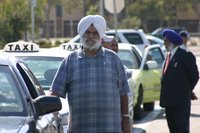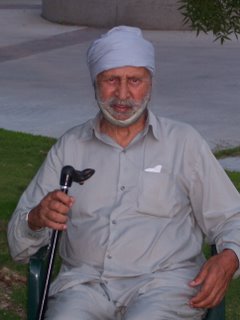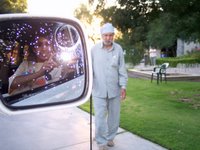Murder, Memory and Mourning
 One month ago, on Christmas morning, Gurpartap Singh was murdered in his cab in Richmond, California. He was a turbaned Sikh cab driver, the fifth to be shot in the San Francisco Bay Area since 2002. The police called the murder an attempted robbery; local Sikhs saw it as part of a pattern of violence against their community since 9/11.
One month ago, on Christmas morning, Gurpartap Singh was murdered in his cab in Richmond, California. He was a turbaned Sikh cab driver, the fifth to be shot in the San Francisco Bay Area since 2002. The police called the murder an attempted robbery; local Sikhs saw it as part of a pattern of violence against their community since 9/11.
I found out about Gurpartap’s murder the day after Christmas. We were eating chocolate chip pancakes around the kitchen table when the call came. I stumbled upstairs, took in the news, Christmas news. I did not know Gurpartap. I registered his death as yet another murder in the city of Richmond, another possible hate crime, another piece of evidence to include in our film.
 I was on the phone immediately. I called cab drivers we had filmed (pictured) and police officers we had interviewed at the Richmond Police Department. I called leaders at the local Sikh temple, El Sobrante Gurdwara, and reporters at the Contra Costa Times. My cousins downstairs had forgotten about me; I was lost to a bout of furious action, what my family has come to call my ‘passion’ but what I know to be my ‘desperate-need-to-overcome-helplessness-in-the-face-of-violence.’ Then I got an email. It was from S., my friend, a fellow student. She knew Gurpartap:
I was on the phone immediately. I called cab drivers we had filmed (pictured) and police officers we had interviewed at the Richmond Police Department. I called leaders at the local Sikh temple, El Sobrante Gurdwara, and reporters at the Contra Costa Times. My cousins downstairs had forgotten about me; I was lost to a bout of furious action, what my family has come to call my ‘passion’ but what I know to be my ‘desperate-need-to-overcome-helplessness-in-the-face-of-violence.’ Then I got an email. It was from S., my friend, a fellow student. She knew Gurpartap:
Wish you could just be here to help me just now. Gurpartap, the cab driver who was so kind and helpful to me, who took me into his home, who shared the experience of his gurdwara, who was truly an inspiration, who denied the hate in hate crimes… is dead, shot by the same sort of person that I was trying to write about, so that understanding might help put a stop to such horrible crimes. I can’t say how devastated I am. I cannot write Punjabi, and Surinder, his wife, does not understand English – I so want to send her my sympathy… Oh, G-d: why do such things happen? Please, please: send a bit of the light you are trying to spread. I feel it is truly dark right now.
I wrote S. only one prescription: “I think the best thing we can do is to channel the sadness into action.” I encouraged her to write a letter to the editor and offered to help get it published. She said she would think about it.
 A few days later, while I was still at home, my grandfather’s health declined rapidly. Each afternoon, I sat by his side as Parkinson’s took his body whole. I wondered how much time we had left – and how I would come to remember him. Would I remember my childhood naps on his shoulder, drifting to sleep gazing at his ivory feet. Would I remember my shrieks when he became the tickle monster and asked us, ‘Happy, happy?’ Would I remember watching him in his garden, tall and stoic from his military days, overseeing his orders of tomatoe and squash. Would I remember the time his words of disapproval stung the center of my heart. Would I remember his slow moving mouth, his elegant speech, dictating his life story as I wrote down his every word, clinging to his every memory as if this were the last chance.
A few days later, while I was still at home, my grandfather’s health declined rapidly. Each afternoon, I sat by his side as Parkinson’s took his body whole. I wondered how much time we had left – and how I would come to remember him. Would I remember my childhood naps on his shoulder, drifting to sleep gazing at his ivory feet. Would I remember my shrieks when he became the tickle monster and asked us, ‘Happy, happy?’ Would I remember watching him in his garden, tall and stoic from his military days, overseeing his orders of tomatoe and squash. Would I remember the time his words of disapproval stung the center of my heart. Would I remember his slow moving mouth, his elegant speech, dictating his life story as I wrote down his every word, clinging to his every memory as if this were the last chance.
On these afternoons at his bedside, I was mourning my grandfather’s death before he had even left me. I let this pre-mourning prepare me for the grief that I knew would soon strike hard, sudden, like a knife. On one of these afternoons, I received another email from S., who had just returned form Gurpartap’s funeral:
I was just so lost at the funeral. I didn’t know how to contain my feelings, with Gurpartap lying there, all “fixed” for those to see – with Surinder crying quietly and that lovely granthi chanting the long service, which I so wished I could understand. Then when the time came for loving remembrances, Navjot turned and asked me to say something. I had to walk the long way up to the reader’s stand and really had so many feelings and memories to express, but said barely anything – the words just wouldn’t come… Oh, Valarie! I miss him so! He would have been heartened that so many of his friends were there together. Navjot is a proud offspring of his father. He was also so kind and loving–I am just speechless. I am sorry if I did not feel driven to make the death an issue for the public. It just felt like so private a time.
 I wondered what S. and others said in their ‘loving remembrances’ of Gurpartap and for the first time, I began to imagine what I would remember about him if I had known him (pictured). Would I remember his eyes. The sound of his voice. The prayers he recited in the morning. His gesticulations at the dinner table. His faith in the goodness in people. The way he looked at his son. How does memory choose the details that are remembered, how is it shaped by the story we tell ourselves about that person?
I wondered what S. and others said in their ‘loving remembrances’ of Gurpartap and for the first time, I began to imagine what I would remember about him if I had known him (pictured). Would I remember his eyes. The sound of his voice. The prayers he recited in the morning. His gesticulations at the dinner table. His faith in the goodness in people. The way he looked at his son. How does memory choose the details that are remembered, how is it shaped by the story we tell ourselves about that person?
 For the police, on the other hand, Gurpartap is not a story but a statistic. They will remember him as another murdered cabbie, yet another mark on their record. Locals who read the newspaper articles about him will barely remember his name now, a month later. Even activists will remember Gurpartap Singh’s death as further evidence of racial violence after 9/11, another case to cite, a murder that happened (symbolically) on Christmas morning.
For the police, on the other hand, Gurpartap is not a story but a statistic. They will remember him as another murdered cabbie, yet another mark on their record. Locals who read the newspaper articles about him will barely remember his name now, a month later. Even activists will remember Gurpartap Singh’s death as further evidence of racial violence after 9/11, another case to cite, a murder that happened (symbolically) on Christmas morning.
 I suddenly realize that I am (shamefully) one such person. I have remembered Gurpartap as a statistic, a subject for the camera. How could I have ever told S., “Channel your grief into action.” As if there is a formula to healing! As if the ways of memory would ever allow such a formula.
I suddenly realize that I am (shamefully) one such person. I have remembered Gurpartap as a statistic, a subject for the camera. How could I have ever told S., “Channel your grief into action.” As if there is a formula to healing! As if the ways of memory would ever allow such a formula.
I had forgotten that grief comes hard
and fast. It knocks you down and works through your body before it can release you for action. In a culture that hides death, it is easy to forget to allow others (and myself) time and space to grieve, to mourn, to remember, in order to make the meaning required for meaningful action.
All this thought about murder, memory, and mourning has found its way deep into my psyche. Last night, I dreamt that I was raped (this is every woman’s terror), then killed; and when my body was placed in the ambulance, the nurses (who were hungry) ate my body. They started with my stomach. “Just like an eggplant sandwich!” they laughed.
There is the fear of not being remembered – of being reduced to a corpse, a statistic, a case study for consumption.
I must refuse to treat Gurpartap Singh that way, just as I could never treat my grandfather that way. Memory makes it possible to mourn a person’s death without ever having met them. Remembering the memories others have of Gurpartap in life becomes a way to mourn him in death – a safeguard against the dangers of consuming the dead for one’s own means.
 I kiss my grandfather’s cheek and leave home, leave California. Back in Boston, I return to working on my documentary. Both my grandfather and the cab drivers appear in the film, their voices preserved as sound-bytes: this is how audiences will remember them. What fragments! What fractions of the human personality. What a metaphor for life: we show each other only glimpses, and ask to be remembered whole.
I kiss my grandfather’s cheek and leave home, leave California. Back in Boston, I return to working on my documentary. Both my grandfather and the cab drivers appear in the film, their voices preserved as sound-bytes: this is how audiences will remember them. What fragments! What fractions of the human personality. What a metaphor for life: we show each other only glimpses, and ask to be remembered whole.
And somehow, miraculously, it is enough (more than enough) to keep us going.

